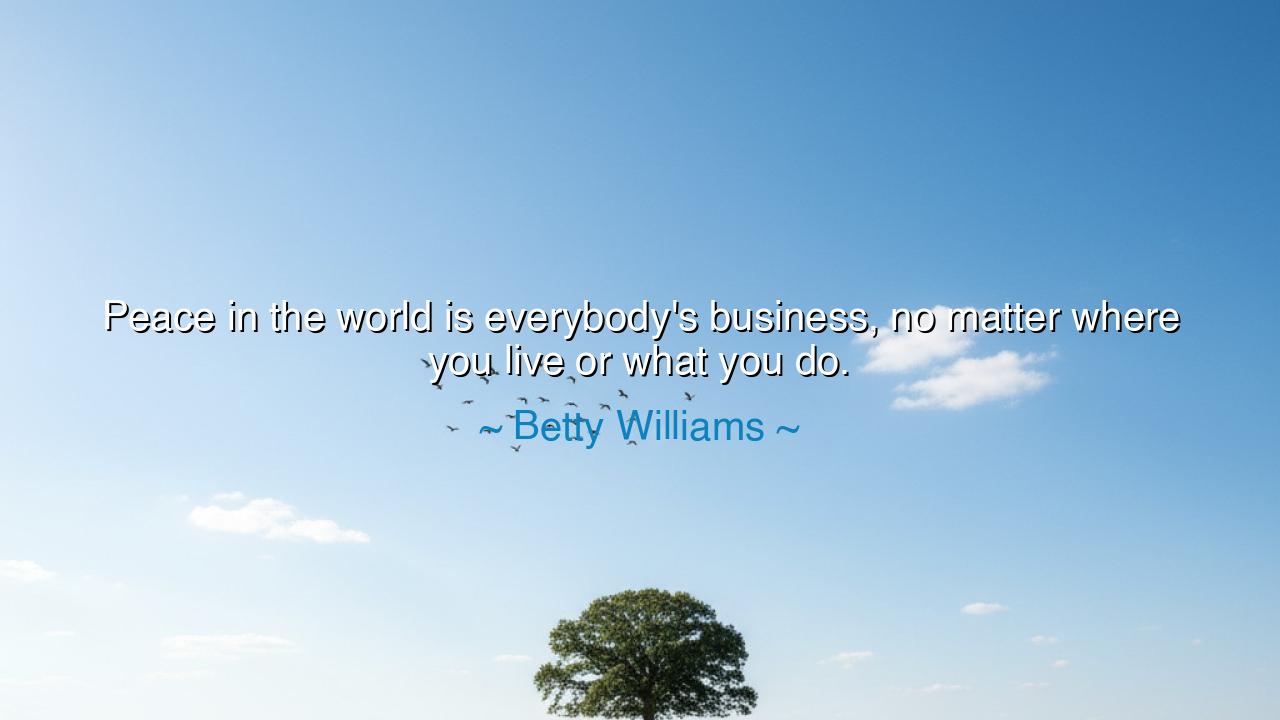
Peace in the world is everybody's business, no matter where you






Host: The harbor was still at twilight, its water an expanse of molten silver under the dimming sky. The air smelled of salt, metal, and the faint sweetness of oil from docked boats. The city behind them murmured like a distant tide — faint car horns, a bus sighing, the soft shuffle of life that never entirely sleeps.
On the old pier, where the wood creaked and the gulls circled lazily, Jack leaned on the rail, watching the fading horizon where sea met sky. His hands were in his coat pockets, his shoulders bent slightly forward, as if the weight of the world were something physical.
Jeeny stood beside him, a thermos steaming faintly in her hands. She didn’t speak for a long time. When she did, it was with a quiet strength that matched the stillness around them.
Jeeny: “Betty Williams once said, ‘Peace in the world is everybody’s business, no matter where you live or what you do.’”
Jack: (nodding slowly) “Yeah. Sounds like something only someone who’s seen too much violence would have the right to say.”
Jeeny: “She earned it. She started with nothing but grief — two children killed in front of her house. Out of that, she built the Peace People in Northern Ireland. Ordinary citizens standing up against a war they didn’t start but kept suffering from.”
Jack: (quietly) “I remember that story. She wasn’t a politician. She wasn’t a general. Just… human.”
Jeeny: “Exactly. That’s why what she said still matters. Peace isn’t for the powerful — it’s for the present. It’s the responsibility of everyone who can draw breath and choose not to hate.”
Host: The wind shifted, brushing through Jeeny’s hair, sending a strand across her face. Jack turned slightly, studying her, his expression a mix of admiration and fatigue.
Jack: “You think people still believe that? That peace is everyone’s business? Feels like most people have outsourced it to governments, charities, or hashtags.”
Jeeny: “Because it’s easier to watch peace like a movie than to make it like a meal. But Williams didn’t mean peace in the political sense. She meant the daily version — the kind we practice with each other.”
Jack: “You mean — not yelling at the barista, not ghosting someone, not starting wars on social media.”
Jeeny: (smiling faintly) “Exactly. The micro kind of peace. The human scale.”
Host: The harbor water rippled with the reflection of distant lights. Somewhere across the bay, a bell rang — one long note, fading like a memory.
Jack: “But that’s the thing, isn’t it? Small peace doesn’t feel like enough. The world burns, and we light candles.”
Jeeny: “But that’s how it begins. Betty Williams didn’t have an army. She had outrage, compassion, and a few thousand people with candles. You can’t underestimate the rebellion of empathy.”
Jack: “Empathy as rebellion.”
Jeeny: “Yes. Because it threatens the systems built on division. You start seeing your enemy as a human being, and suddenly, war loses its meaning.”
Host: A gust of wind caught the pier, rattling the metal rail slightly. The last light of sunset disappeared behind the clouds, leaving a slow, steady dusk.
Jack: “You know, peace feels like such a soft word. People don’t take it seriously. They associate it with weakness, with surrender.”
Jeeny: “That’s because they confuse peace with passivity. But peace isn’t weak — it’s hard work. It’s restraint when anger feels easier. It’s forgiveness when revenge feels righteous.”
Jack: “So, peace is active.”
Jeeny: “Always. It’s an act of building. Violence destroys — instantly, spectacularly. Peace builds — quietly, slowly. That’s why people lose patience with it.”
Host: Jack watched the horizon again. The water was dark now, but not black — the kind of darkness that hinted at reflection rather than absence.
Jack: “You think we can actually achieve world peace? Or is it just a comforting myth we tell ourselves?”
Jeeny: “World peace? Maybe not. But we can achieve world participation. Every act of decency, every refusal to dehumanize, every choice not to escalate — that’s a thread in the larger fabric.”
Jack: “So, you’re saying peace is cumulative.”
Jeeny: “Yes. Like drops in an ocean. You can’t see the individual ripples, but together, they change the tide.”
Host: The city lights blinked on across the water — hundreds of small fires in the dark. Jeeny poured two cups from her thermos, handing one to Jack. Steam rose between them, dissolving in the cool air.
Jack: “You know, I think people avoid thinking about peace because it forces them to confront their own capacity for cruelty. It’s easy to point at warlords and governments — harder to look at how we treat the people in front of us.”
Jeeny: “Exactly. Peace begins in the smallest conflicts — how we argue, how we forgive, how we listen.”
Jack: “So, in a way, peace is the art of restraint.”
Jeeny: “And of imagination. You have to imagine the world you want, then act as if it already exists.”
Host: The sound of the waves deepened. The pier moaned softly beneath their weight, old wood remembering storms.
Jack: “I used to think peace was the opposite of chaos. But






AAdministratorAdministrator
Welcome, honored guests. Please leave a comment, we will respond soon